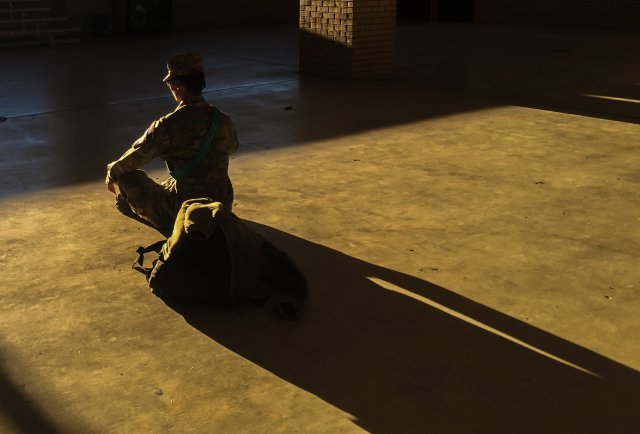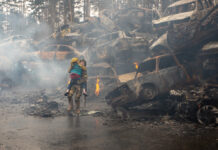A new study, published in the journal of Psychiatric Research and Clinical Practice, investigates the effect of complementary, integrative therapies in the treatment of Post Traumatic Stress Disorder (PTSD) for U.S. military veterans. The results of the multisite randomized control study indicate that both Mindfulness-Based Stress Reduction (MBSR) and Present-Centered Group Therapy (PCGT) may be effective complementary treatment options for PTSD, with significant improvements in self-report data reported by MBSR participants.
“The therapeutic process in the treatment of PTSD depends on the simultaneous presence of vivid experience and nonreactivity. Simple distraction from the distressing cognitions and emotions provides only temporary relief, as the underlying circuits remain intact and ready to fire whenever triggered,” the authors, led by Lori Davis from the University of Alabama School of Medicine. “In the case of MBSR, traumatic memories that arise may be experienced within an accepting frame of mind and be less likely to induce the fear-conditioned stress response.”

VIEW ORIGINAL
While the American Psychiatric Association recommends trauma-based psychotherapies and psychotropic medications as first-line interventions for Post-Traumatic Stress Disorder (PTSD), others have raised concerns about the use of psychotropic treatments for PTSD.
Davis and her colleagues conceptualize PTSD as “an overgeneralization of a conditioned fight-or-flight response to previously neutral stimuli . . . firing automatically in response to stimuli that would be better served by a more flexible response.”
Treatment for PTSD involves utilizing neuroplasticity to form and strengthen new neural circuits in ways that are adaptive for the individual’s life. Mindfulness-Based Stress Reduction (MBSR) is one therapy mentioned as a non-medical option to treat PTSD. MBSR is an evidence-based treatment that has been shown to decrease anxiety, prevent depression relapse, and have been used to reduce suicidal thoughts and improve wellbeing.
“In theory, mindfulness could be useful in the treatment of PTSD, in teaching patients to stay in the moment and not dwell on past or future events beyond their control,” the authors write. “This less reactive mode of coping may provide a way for people with PTSD to feel a greater sense of control and be less avoidant, which may lead to improved quality of life and emotional well-being.”
The current study attempts to investigate the effect of MBSR as a complementary and integrative health approach to treating U.S. military veterans diagnosed with PTSD. The studied took place at three separate clinical sites in the United States. Participating veterans were randomized to receive either eight weeks of MBSR training or eight weeks of Present Centered Group Therapy (PCGT), chosen as a control group.
PCGT, a secondary complimentary group-based treatment, shares similarities with the MBSR group. The group therapy approach aimed to reduce symptoms by normalizing veterans’ experiences, decreasing isolation, and increasing awareness and objectivity of how PTSD affects one’s daily life.
Primary outcomes were evaluated using the Clinician-Administered PTSD Scale for DSM-IV (CAPS-IV) as well as participant’s self-report responses on a PTSD Checklist (PCT), a 17-item self-report scale. Data were collected at baseline, three weeks, six weeks, and nine weeks (one-week post-intervention).
Following eight weeks of receiving either MBSR or PCGT treatment, data were collected and analyzed. Both MBSR and PCGT participants showed significant improvements in PTSD symptomology according to the CAPS-IV scale (completed by clinicians). This outcome suggests therapies with aspects of group cohesion, validation from other veterans, health education, and psychosocial support are beneficial interventions for veterans with PTSD.
On the 17-item self-report scale completed by veterans following the study, individuals indicated that they “felt greater efficacy and control, which led to a perception of clinical improvement that was not noted by investigators charting symptoms.” While MBSR and PCGT participants both showed reductions in symptomology from a clinician’s point of view, participants in the MBSR group endorsed greater felt wellbeing than the PCGT control group.
More research is needed to understand the mechanisms of complementary therapies such as MBSR and PCGT. However, studies like this are encouraging, provide support for non-medical based therapies, and assist in the treatment of disorders such as PTSD for veterans and civilian populations.
**
You can find a list of non-drug treatments for PTSD here: https://www.madinamerica.com/non-drug-therapies-ptsd/
****
Davis, L. L., Whetsell, C., Hamner, M. B., Carmody, J., Rothbaum, B. O., Allen, R. S., … & Bremner, J. D. (2018). A Multisite Randomized Controlled Trial of Mindfulness-Based Stress Reduction in the Treatment of Posttraumatic Stress Disorder. Psychiatric Research and Clinical Practice, appi-prcp. (Link)















I find the microbiome – mind-gut-axis – approach much more realistic. It also explains why ptsd is so hard to export to other cultures after natural disasters. One thing Westerners, Americans in particular, share is a similar microbiome. So similar, in fact, that immigrants begin to lose their native bacterial loads almost immediately upon arrival even when they keep their traditional diet.
A new study backs up the notion that PTSD is correlated with changes in gut bacteria that effect the brains ability to recover from traumatic experiences. I’ve really had enough of the mindfulness angle. It’s essentially gaslighting to continue with the “change your mind, change your life” narrative.
https://www.newsweek.com/gut-instinct-post-traumatic-stress-disorder-may-related-gut-bacteria-scientific-study-says-1467372
Report comment
These investigators have also avoided paying attention to mega-nutrient therapies as well, maybe because the villainous psychiatric knight, Abram Hoffer, recommended them after his success treating PTSD troops and Death Camp survivors with multigram doses of B3 per day.
Report comment
How troubling to see that MIA is again — and this time in a major way! — publishing a piece in which “PTSD” is used without the least mention of the unscientific nature of the category, the way it pathologizes people who are having deeply human reactions to trauma, and the devastating harm the label has caused. Do some people say they want the label applied to them? Yes. That is nearly always because (1)It’s the only time anyone has ever tried to convey, ‘I believe you’re suffering,’ but that could be done by using those nonpathologizing words instead; (2)The labeled person BELIEVES that getting a label represents something scientific that will pave the way to relief from their suffering; and/or (3)They cannot get certain benefits unless they accept a label. Re: (3), I tell people that since the system providing benefits is intractable, if accepting the label gets them what they need, they should nevertheless know in their hearts that they are not mentally ill for being upset by trauma. I address these problems in a couple of my books. Most importantly, I have heard the devastating stories of people who have suffered because of getting this label.
Report comment
Group therapy can easily exacerbate post traumatic stress, and it usually does.
Report comment
Defining the problem as some “disorder” of the “patient” needing “therapy” is fine if one’s aim is to deflect attention away from the epidemic of Military Sexual Assault (MSA). It helps to blame the victim, and reinforce the ideal that perpetrators should be rewarded while their prey are retaliated against.
MSA is probably the leading trauma among active duty and vets “diagnosed” for their understandable responses to such trauma mislabeled as “symptoms”.
Pathologizing and gaslighting such traumatized active duty and vets helps ensure the continuation of the epidemic of MSA, and the further traumatizing it entails. The real remedy is JUSTICE NOT TREATMENT. Instead of medicalizing the victims, make perps accountable under civil and criminal judicial systems instead of bloating the medical system with bogus “diagnoses”.
Report comment
I had not thought of that, but it makes complete sense that they’d want to subsume sexual assaults under “PTSD” so that it can be palmed off as combat trauma or something other than what it is. When will we learn?
Report comment
Yes, covering up child abuse and rape is the primary actual societal function of both the psychologists and psychiatrists, in general, and apparently has been for over a century.
https://www.indybay.org/newsitems/2019/01/23/18820633.php?fbclid=IwAR2-cgZPcEvbz7yFqMuUwneIuaqGleGiOzackY4N2sPeVXolwmEga5iKxdo
https://www.madinamerica.com/2016/04/heal-for-life/
And NO DSM billing code “mental health” worker may EVER bill ANY insurance company for EVER helping ANY child abuse or rape survivor EVER, unless they misdiagnose them with one of the billable DSM disorders. So they always do, because they want to get paid.
https://www.psychologytoday.com/us/blog/your-child-does-not-have-bipolar-disorder/201402/dsm-5-and-child-neglect-and-abuse-1
Our “mental health” industry is, in actuality, primarily a child abuse and rape covering up, scientifically “invalid” industry. And given that today, “the prevalence of childhood trauma exposure within borderline personality disorder patients has been evidenced to be as high as 92% (Yen et al., 2002). Within individuals diagnosed with psychotic or affective disorders, it reaches 82% (Larsson et al., 2012).”
Most “mental health” workers likely belong in jail for systemically aiding, abetting, and empowering the pedophiles and rapists on a massive societal scale. And, of course, such systemic “mental health” industry abuse and rape covering up crimes do have societal consequences.
https://www.amazon.com/Pedophilia-Empire-Chapter-Introduction-Disorder-ebook/dp/B0773QHGPT
https://community.healthimpactnews.com/topic/4576/america-1-in-child-sex-trafficking-and-pedophilia-cps-and-foster-care-are-the-pipelines
Let’s hope the “mental health” industry some day gets out of the child abuse and rape covering up business.
Report comment
Always, always it becomes a disorder. For god’s sake, the only reason people get the label is because they know they are not MI, but they have no where to ever be told that what they feel is real. Nope, gotta do some brain imaging looking at the different areas light up, not even knowing what came first or if that part that is lighting up is indeed needed within the whole context of that person. They present their little imaging as some kind of science, and people believe this crap. I hear “ohhh but they have real evidence now with “spect scans”. PFFFT, the same people are impressed with images from the moon, mars, not realizing that the space one sees does not even touch the big picture. People really believe that we should just keep exploring, that the answers will be found. I say go right ahead but leave humans out of it with the theories. To suspect that other inhabited planets exist is theory. If we suspect that, then possibly they are toying with us. But if we suggest that, we are MI. Of course I do not know if other planets are toying with us, my point is, it would not be seen as an MI if I had a PHD in austronomy and suggested it. I do hope that the other planets do not have psychiatry.
Report comment